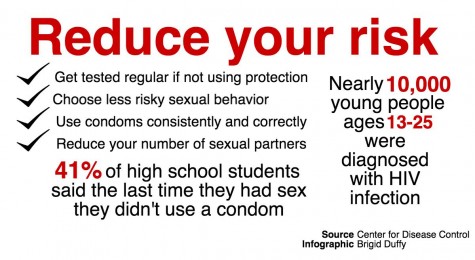Let’s talk about sex
Teens waste precious talk on unrealistic expectations
September 25, 2015
From ads to movie scenes, to songs and the internet, sex surrounds society. The media imprints an improbable version of sex in our brains. Because of this assumption that sex is just like the movies, teenagers disregard the importance of practicing safe sex.
According to a survey conducted by the Daily Beast in 1970, 47 percent of people saw premarital sex as OK, while their similar study from 2015 showed 62 percent of people viewed it as OK. According to the Daily Beast, the concept of casual hookups and relationships are manifested in our society of growing teens.
Teens are more open to talking about this topic because it pervades teens’ culture. Generations ago, most teens would have died of embarrassment talking about sex with their parents, but today many teens have watched awkward sex scenes with their families.
Generations before viewed talking about sex as taboo, when in reality, society should be talking about sex more. There are many more frightening realities teenagers don’t know about, and teaching abstinence-only education leads to misinformed, confused teens.
According to the Centers for Disease Control and Prevention, states that teach abstinence-only education have the highest rates of teen pregnancy, such as Mississippi. Other states with high teen pregnancy rates don’t require sex-education, and if they do it’s abstinence-only, which is not effective.
Teenagers are bombarded by movies that display unrealistic expectations which can put the wrong idea in someone’s head. There is a lack of consent in movies, and no, not all sex should happen in cars. Teens may feel the pressure to have sex in high school based on the ways it’s portrayed in the media, because it is seen as something teens are “supposed” to do.
When teens have little or wrong information, they make decisions based on what they see in the media. Society should move the topic away from the so-called “image” of sex and move toward the topic of safe sex. For example, we may be talking more about sex, but not in a realistic or healthy way.
1 in 2 sexually active people will contract a sexually transmitted disease/infection (STD/STI) by the age of 25, according to the American Sexual Health Association. If schools improved their health education, this wouldn’t be a problem.
Park students have taken it into their own hands to inform teenagers in the community about safe sex. In 2014, students started their very own Sexual Health Education Club, the first in the state of Minnesota. The goal of the club is to educate students about sex and how to practice safe sex. This is a productive form of education because it makes the discussion open for anyone.
Although sex may be an uncomfortable topic, it is necessary to talk about. Without discussion, more teens will be misinformed about their sexual health and make the wrong choices when it comes to sex.













